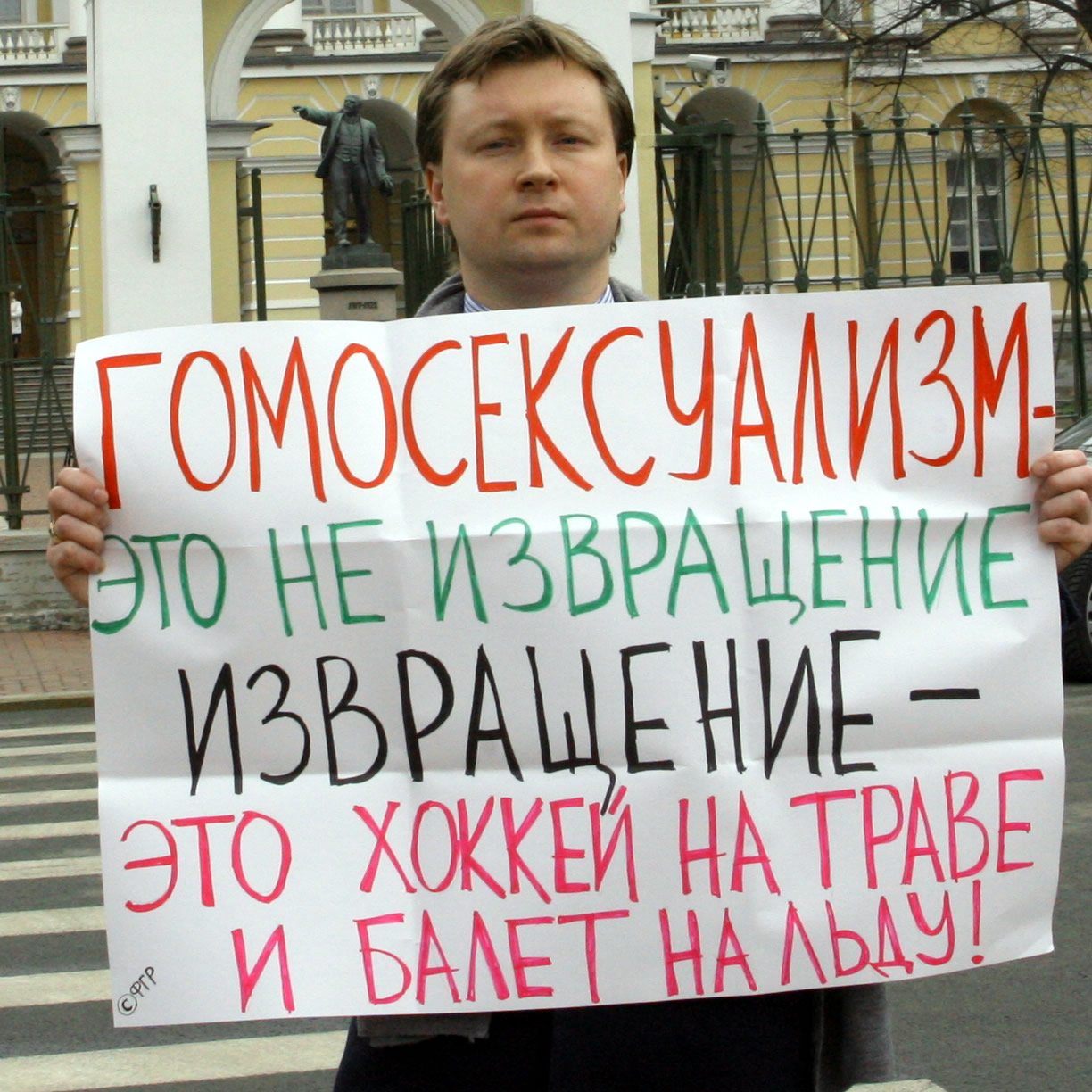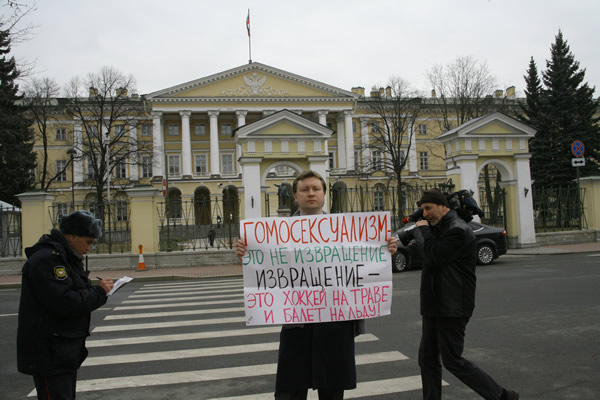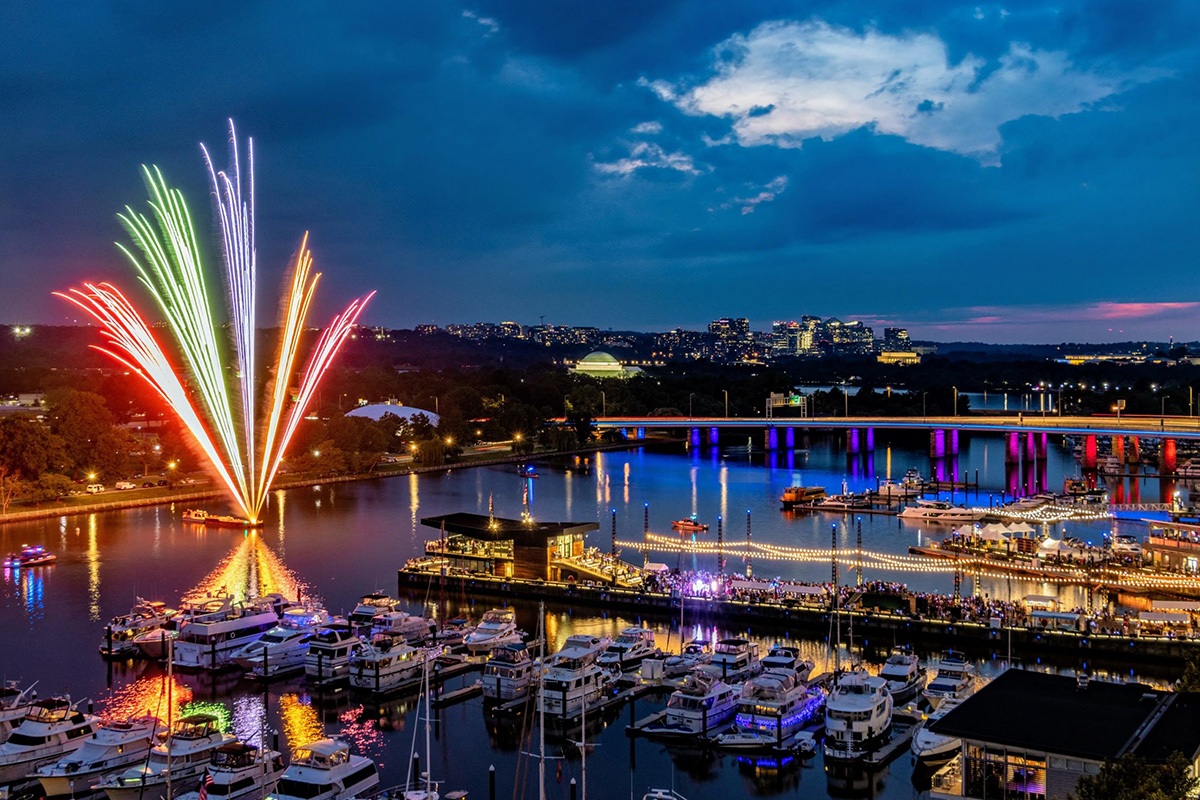News
‘Dangerous’ time in Russia
Violence, anti-gay legislation prompt calls for Sochi Olympics boycott


Nikolai Alekseev in 2012 holds a sign in St. Petersburg that reads “homosexuality is not a perversion. Perersion is grass hockey and ice ballet.” He was fined 5,000 rubles ($154) for violating the city’s ban on gay propaganda to minors. (Photo courtesy of GayRussia.ru)
As LGBT rights advance in the United States, gays in Russia are experiencing the opposite trend: an erosion of rights and a violent backlash against those fighting for equality there.
Russian lawmakers on Tuesday approved a bill that would ban the “promotion of homosexuality” to minors, leading some to urge a U.S. boycott of the 2014 Winter Olympics in Sochi.
The measure passed in the Duma by a 436-0 vote margin with one abstention. Individuals would face fines of between 4,000 and 5,000 rubles ($124-$155,) and government officials would face fines of between 40,000 and 50,000 rubles ($1,241-$1,551.)
Media organizations and other groups would face a fine of up to 1 million rubles ($31,000) or suspension of their activities for up to 90 days. Foreigners could also face up to 15 days in jail and deportation.
Nikolai Alekseev of Gay Russia, an LGBT advocacy group, told the Washington Blade from Moscow on Wednesday he “was expecting” lawmakers would support the measure. He noted programs on Russian television were largely supportive of the measure – and some of its supporters publicly compared homosexuality to pedophilia.
The Federation Council, Russia’s upper house of parliament, still needs to approve the bill, but observers expect it will easily pass.
President Vladimir Putin, who announced his divorce from his wife of 30 years last week, is expected to sign it into law.
“I was sure it would be passed,” Alekseev said. “It will now be signed by the president, who is very much using this fight against homosexuals in his campaign to attract voters.”
The State Department in January criticized the passage of the “promotion of homosexuality” bill on its first reading. The United Nations, Amnesty International and German Chancellor Angela Merkel are among those who have also spoken out against the measure.
“Russia is trying very hard to make discrimination look respectable by calling it ‘tradition,’ but whatever term is used in the bill, it remains discrimination and a violation of the basic human rights of LGBT people,” Graeme Reid, LGBT rights program director at Human Rights Watch, said. “To try to exclude LGBT people as ‘non-traditional’ is to try and make them less than human. It is cynical, and it is dangerous.”
“This is a very sad day for the Russian LGBTI community and for Russian democracy,” Martin K. I. Christensen, co-chair of ILGA-Europe’s Executive Board, added.
The measure passed amid growing concerns over anti-LGBT violence and discrimination in the country.
Two men allegedly sodomized Vladislav Tornovoi with empty beer bottles and set his body on fire near Volgograd on May 10 after he reportedly came out to them. Reuters on June 3 reported authorities on the Kamchatka Peninsula in Russia’s Far East said three men stabbed and trampled a gay man to death late last month before they set his car on fire with his body inside.
Russian lawmakers are also poised to ban foreign same-sex couples from adopting Russian children.
Alekseev said hundreds of skinheads and other anti-gay demonstrators confronted the few dozen LGBT protesters who kissed outside the Duma before Tuesday’s vote. He noted several of the advocates were attacked; and one of them remains in the hospital.
Alekseev said authorities arrested many of the LGBT activists and “didn’t touch any of the anti-gay protesters.”
“We’re quite used to such hostility and to such arrest,” he told the Blade.
Boycott Sochi Olympics?
HereTV.com host Jim Morrison posted a petition to the White House’s website after Tuesday’s vote that calls for a boycott of the 2014 Winter Olympics that will take place in the Russian city of Sochi in February.
“For my country to participate in this is outlandish,” he told the Blade.
A Russian appeals court in March 2012 upheld a lower court ruling that blocked a group that sought to disseminate information on the Russian LGBT rights movement during the Sochi games.
Alekseev, who has appealed the decision to the European Court of Human Rights, noted the country will also host the 2018 World Cup.
He said economic sanctions against Russia is one way to pressure the government to improve its record on LGBT rights and other human rights issues. Alekseev added, however, the international community “should think” before it decides to participate in the Sochi Olympics and the World Cup.
“[They are] a very good opportunity to raise particular concerns,” he said. “One of the ways for many countries would be to boycott these international sporting events because they take place in a country which doesn’t respect basic human rights.”
The United States and other countries boycotted the 1980 Summer Olympics in Moscow in response to the Soviet Union’s invasion of Afghanistan the year before.
Cyd Zeigler, Jr., co-founder of Outsports.com, described the boycott as “the biggest black eye this country has ever self-inflicted.”
“The Olympics are supposed to be apolitical,” he said, noting gay Olympic diver Greg Louganis was unable to compete because then-President Jimmy Carter decided to boycott the games. “To start playing politics by removing an opportunity for these athletes to participate — something they’ve been working for all their lives would be a disgrace.”
Blake Skjellerup, a gay short track speed skater from New Zealand who plans to compete in Sochi, said he would not support a boycott of the games.
“The Olympic games for athletes is something they dream of their whole life and spend their whole life working for,” he told the Blade during an interview on Tuesday night from Calgary where he continues to train. “To have that swept away from underneath you is pretty shocking.”
Gay gymnast Josh Dixon, who finished 13th at the Olympic trials ahead of last summer’s London games, said there would be “nothing more disheartening” than to “discredit the years of work put into accomplishing a goal taken away for political reasons.”
“To have that work taken away, let alone the time it took to reach such a level, would be gut-wrenching,” he told the Blade.
Zeigler and Skjellerup both said they support any athlete who decides to publicly speak out against LGBT rights abuses in Russia.
“I’ll be focusing 110 percent on my competing,” Skjellerup said. “I’m not going to tone down the sort of person that I am just because I’m in a country that has these barbaric laws that exist saying that who I am is wrong.”
The U.S. Olympic Committee did not respond to the Blade’s request for comment.
District of Columbia
LGBTQ budget advocates fight for D.C. resources in a tough fiscal year
‘Trying to preserve life-saving services’ amid $1 billion cut

The months and days leading up to June are especially busy for LGBTQ Washingtonians. For one group, the DC LGBT Budget Coalition, which works year-round to ensure LGBTQ residents are represented and financially supported by the D.C. government, this time of year is their Super Bowl. Beginning in April, the D.C. Council and Mayor’s Office hold budget hearings for the next fiscal year.
With D.C.’s budget now under review, the Washington Blade spoke with Heidi Ellis, coordinator of the DC LGBT Budget Coalition, about the group’s top priorities and their push to ensure continued support for queer communities.
“The LGBTQ Budget Coalition was founded in 2020 at the height of the pandemic, as a way for the community to work together to advocate for key funding and policy changes,” Ellis said. “We recognized we were stronger together. A lot of groups are often pitted against each other for resources and dollars. This coalition was founded out of a need for unity. Since then, we’ve successfully advocated for more than $20 million in dedicated LGBTQ investments.”
In addition to coordinating the coalition, Ellis is the founder and CEO of HME Consulting & Advocacy, a firm that helps build coalitions and advance policy initiatives that address intersectional issues in the LGBTQ community. One of its most powerful tools, she explained, is direct outreach through community surveys.
“We actually do community surveys to see what people need and what’s top of mind,” Ellis said. “Of course, we also pay attention to the broader political landscape — like the current threats to HIV funding. That helps us prioritize.”
Because the coalition is comprised of more than 20 organizations across various sectors —healthcare, housing, community organizing — Ellis said its diversity enables it to connect grassroots needs to potential policy solutions.
“Our coalition includes service providers, community groups, health and housing advocates-folks who are deeply plugged into what’s happening on the ground,” she said. “They help determine our direction. We know we don’t represent every queer person in D.C., but our coalition reflects a wide range of identities and experiences.”
The insights gathered through those surveys ultimately inform the coalition’s annual budget proposal, which is submitted to the Council and mayor.
“That’s how we got to our FY26 priorities,” she said. “This year, more than ever, we’re fighting to protect what we’ve already secured — funding and policies we’ve had to fight for in the past. We know there’s concern around this budget.”
One of the challenges this year is that the D.C. government’s operating budget and some of its legislation must be approved by Congress. With a projected decline in tax revenue and a Republican-controlled Congress that has historically opposed LGBTQ funding, the Coalition has had to think strategically.
“Even before the situation on the Hill, the CFO projected lower revenue,” Ellis said. “That meant cuts to social programs were already coming. And now, with the $1 billion slashed from D.C.’s budget due to the continuing resolution, we’re not only fighting for D.C.’s budget and autonomy, but also trying to preserve life-saving services. Our message is simple: Don’t forget about queer people.”
This year’s proposal doesn’t include specific dollar figures. Instead, the Coalition outlines five funding priority areas: Healthcare, Employment & Economic Equity, Housing, Safety & Community Support, and Civil Rights.
Why no exact amounts? Ellis said it’s because not all solutions are financial.
“Some of our asks don’t require new funding. Others build on existing programs-we’re asking whether the current use of funds is the most effective. We’re also proposing policy changes that wouldn’t cost extra but could make a real difference. It’s about using what we have better,” she said.
When drafting the proposal, the Coalition tries to prioritize those with the most pressing and intersecting needs.
“Our perspective is: If we advocate for the most vulnerable, others benefit too,” Ellis said. “Take LGBTQ seniors. Some may have done well in life but now face housing insecurity or struggle to access affordable healthcare. Many in our coalition are elders who fought on the frontlines during the AIDS epidemic. They bring critical historical context and remind us that Black and brown communities bore the brunt of that crisis.”
“I love our coalition because it keeps us accountable to the moment,” she added. “If we center those most marginalized, we can make an impact that lifts everyone.”
In addition to healthcare and housing, safety remains a top concern. The Coalition has fought to maintain funding for the Violence Prevention and Response Team (VPART), a city-supported group that includes MPD, community-based organizations, and the Mayor’s Office of LGBTQ Affairs. VPART responds to crimes affecting the LGBTQ community and connects victims to legal, healthcare, and housing services.
“We’ve pushed to make VPART more proactive, not just reactive,” Ellis said. “The funding we’ve secured has helped survivors get the support they need. Cutting that funding now would undo progress we’re just beginning to see.”
At the end of the day, Ellis emphasized that this process is about far more than spreadsheets.
“A budget is a moral document,” she said. “If we’re not represented, you’re telling us our lives don’t matter at a time when we need protection the most. When people can’t get food, medicine, housing — that has a devastating impact. These are vital services.”
The DC LGBT Budget Coalition is urging residents to support a letter-writing campaign to D.C. Council members and the mayor. You can send a letter here: https://actionnetwork.org/letters/fully-fund-dcs-lgbtq-communities
Read the full FY26 budget proposal here: https://drive.google.com/file/d/1bTrENnc4ZazJTO6LPrQ3lZkF02QNIIf1/view
Arts & Entertainment
Washington Blade’s Pride on the Pier returns bigger than ever with two-day WorldPride celebration

The Washington Blade’s Pride on the Pier will be extended to a two-day celebration in honor of WorldPride coming to D.C. this year. Taking place on Friday, June 6 and Saturday, June 7 at The Wharf, this year’s event promises more entertainment, more community, and more pride than ever before — all set against the stunning waterfront backdrop of our nation’s capital.
With the addition of Friday, the party kicks off at 3 p.m., with the inaugural WorldPride Boat Parade at 7 p.m. As an Official WorldPride Partner event, the boat parade will feature 30 decorated boats parading along the Washington Channel. For information on signing up for the boat parade contact Stephen Rutgers at [email protected].
Saturday’s signature Pier Party kicks off at 12 p.m., featuring a drag show, DJ’s, streaming of the WorldPride Parade, and the iconic Fireworks Show Presented by the Leonard-Litz Foundation — one of D.C. Pride’s most anticipated spectacles.
“We’re expanding Washington Blade Pride on the Pier to reflect the excitement and momentum building for WorldPride in D.C.,” said Blade publisher Lynne Brown. “It’s a celebration of our community’s progress and a powerful reminder of the joy and visibility Pride brings to the heart of our city.”
Now in its seventh year, Washington Blade Pride on the Pier extends the city’s annual celebration of LGBTQ visibility to the bustling Wharf waterfront with an exciting array of activities and entertainment for all ages. The District Pier will offer DJs, dancing, drag, and other entertainment. Alcoholic beverages will be available for purchase for those 21 and older.
Pride on the Pier is free and open to the public, with VIP tickets available for exclusive pier access, hosted bars, and private viewing areas for the boat parade and the fireworks show. To purchase VIP tickets visit www.prideonthepierdc.com/vip.
Friday VIP: 5-9 p.m., enjoy an air-conditioned lounge, private bathroom, cash bar and complimentary drink.
Saturday VIP Session #1: 2-5 p.m., enjoy an air-conditioned lounge, private bathroom, catered food, and an open bar.
Saturday VIP Session #2: 6-9 p.m., enjoy the air-conditioned lounge, private bathroom, catered snacks and dinner, and open bar with a front-row view of the fireworks.
Event Details:
📍 Location: District Pier at The Wharf (101 District Sq., S.W., Washington, D.C.)
📅 Dates: Friday, June 6 & Saturday, June 7, 2025
🛥️Boat Parade: 7 p.m. (June 6). 🎆 Fireworks Show: 9 p.m. (June 7)
🎟️ VIP Tickets: www.PrideOnThePierDC.com/VIP
Event sponsors include Absolut, Capital Pride, DC Fray, Infinate Legacy, Heineken, Leonard-Litz Foundation, Mayor’s Office of LGBTQ Affairs, Relish Catering, Washingtonian, and The Wharf. More information regarding activities will be released at www.PrideOnThePierDC.com
Maryland
Md. schools plan to comply with federal DEI demands
Superintendents opt for cooperation over confrontation

By LIZ BOWIE | Deciding not to pick a fight with the Trump administration, Maryland school leaders plan to sign a letter to the U.S. Department of Education that says their school districts are complying with all civil rights laws.
The two-paragraph letter could deflect a confrontation over whether the state’s public schools run diversity, equity, and inclusion programs that the Trump administration has called illegal. The Baltimore Banner reviewed the letter, which was shared by a school administrator who declined to be identified because the letter has not yet been sent.
Maryland school leaders are taking a more conciliatory approach than those in some other states. Education leaders in Minnesota, New York, Colorado, Oregon, Vermont, and Wisconsin said they will not comply with the federal education department’s order, the demands of which, they say, are based on a warped interpretation of civil rights law.
The rest of this article can be found on the Baltimore Banner’s website.
-

 Opinions5 days ago
Opinions5 days agoIt’s time for new leadership on the Maryland LGBTQIA+ Commission
-

 The White House4 days ago
The White House4 days agoWhite House does not ‘respond’ to reporters’ requests with pronouns included
-

 Arts & Entertainment5 days ago
Arts & Entertainment5 days ago‘Gay is Good’ Pride Pils Can Celebrates Frank Kameny’s 100th Birthday for WorldPride in D.C.
-

 Sponsored5 days ago
Sponsored5 days agoTHC Drinks: What You Should Know About Cannabis Beverages












